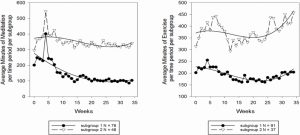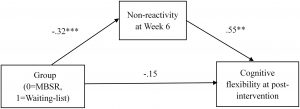Improve Psychological Well-Being, Sleep, and Performance in College Athletes with Mindfulness.
By John M. de Castro, Ph.D.
“How much time do you spend training your body, getting to peak performance? With mindfulness training you can now train your mind. Learn how to focus more effectively, worry less, be more present and increase your ability to respond and react quickly.” – Blair Bowker
Athletic performance requires the harmony of mind and body. Excellence is in part physical and in part psychological. That is why an entire profession of Sports Psychology has developed. “In sport psychology, competitive athletes are taught psychological strategies to better cope with a number of demanding challenges related to psychological functioning.” They use a number of techniques to enhance performance including mindfulness training. It has been shown to improve attention and concentration and emotion regulation and reduces anxiety and worry and rumination, and the physiological and psychological responses to stress. As a result, mindfulness training has been employed by athletes and even by entire teams to enhance their performance.
In today’s Research News article “Mindfulness-Based Stress Reduction Benefits Psychological Well-Being, Sleep Quality, and Athletic Performance in Female Collegiate Rowers.” (See summary below or view the full text of the study at: https://www.frontiersin.org/articles/10.3389/fpsyg.2020.572980/full?utm_source=F-AAE&utm_medium=EMLF&utm_campaign=MRK_1437459_69_Psycho_20200922_arts_A ) Jones and colleagues recruited women members of a college rowing team and randomly assigned them to a no-treatment control condition or to receive 8 weekly 75 minutes group sessions of Mindfulness-Based Stress Reduction (MBSR). This training includes meditation, body scan, yoga, and discussion with daily home practice. They were measured before and after training for athletic coping skills, anxiety, depression, perceived stress, mindfulness, sleepiness, sleep quality, activity during sleep, rumination, and psychological well-being. They were also measured before the treatment and 6 weeks into the 8-week program for rowing performance.
They found that in comparison to baseline and the control group, after Mindfulness-Based Stress Reduction (MBSR) training there were significant increases in mindfulness, psychological well-being, sleep quality, activity during sleep, athletic coping skills, and rowing performance and significant decreases in daytime sleepiness. In addition, they report that the greater the increase in mindfulness the greater the increase in psychological well-being, sleep quality, and athletic coping skills and the greater the decrease in daytime sleepiness.
These are interesting results suggesting that mindfulness training improves the psychological well-being and athletic performance in athletes. But the comparison to a no-treatment condition leaves open alternative interpretations of participant expectancy effects, experimenter bias, attentional effects, etc. In addition, only female athletes were included in the study. Future research should include male athletes and employ an active control comparison condition such as group discussions of college life without mindfulness training.
The results from previous studies have demonstrated that mindfulness training improves the psychological well-being and athletic performance in athletes. So, it is likely that the improvements seen in the present study were also due to the mindfulness training. In addition, the fact that in the group that received Mindfulness-Based Stress Reduction (MBSR) training that the amount of increase in mindfulness was associated with the degree of improvement in the psychological well-being and athletic performance, suggests that mindfulness was the key determinant of the improvements. So, it would appear likely that increasing mindfulness is of great benefit to athletes.
So, improve psychological well-being, sleep, and performance in college athletes with mindfulness.
“mindfulness meditation for athletes can help them control negative thoughts and sports anxiety which allows them to focus on their skills in the present moment and perform better.’ – Ertheo
CMCS – Center for Mindfulness and Contemplative Studies
This and other Contemplative Studies posts are also available on Google+ https://plus.google.com/106784388191201299496/posts and on Twitter @MindfulResearch
Study Summary
Jones BJ, Kaur S, Miller M and Spencer RMC (2020) Mindfulness-Based Stress Reduction Benefits Psychological Well-Being, Sleep Quality, and Athletic Performance in Female Collegiate Rowers. Front. Psychol. 11:572980. doi: 10.3389/fpsyg.2020.572980
Factors such as psychological well-being, sleep quality, and athletic coping skills can influence athletic performance. Mindfulness-based interventions, including mindfulness-based stress reduction (MBSR), have been shown to benefit these factors, suggesting they may, at least indirectly, benefit athletic performance. Moreover, while mindfulness training has been linked to better accuracy in some high-precision sports, whether it can improve non-precision elements of athletic performance is unclear. The objective of this study was to investigate the influence of MBSR on psychological well-being, sleep, athletic coping skills, and rowing performance in collegiate rowers in a controlled experimental design. Members of a Division I NCAA Women’s Rowing team completed either an 8-week MBSR course along with their regular athletic training program (Intervention group) or the athletic training program alone (Control group). Measurements of interest were taken at baseline and again either during or shortly following the intervention. In contrast to the Control group, the Intervention group showed improvements in psychological well-being, subjective and objective sleep quality, athletic coping skills, and rowing performance as measured by a 6,000-m ergometer test. Improvements in athletic coping skills, psychological well-being, and subjective sleep quality were all correlated with increases in mindfulness in the Intervention group. These results suggest that mindfulness training may benefit non-precision aspects of athletic performance. Incorporating mindfulness training into athletic training programs may benefit quality of life and performance in student athletes.









